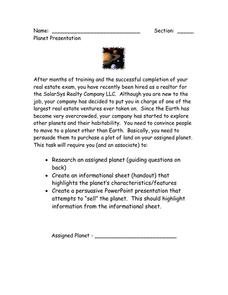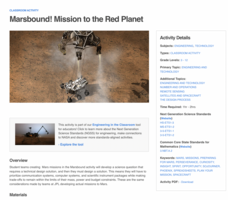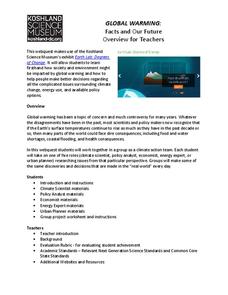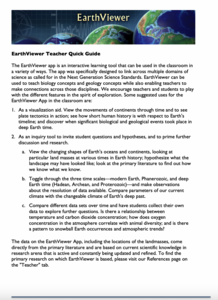Mr. Jones's Science Class
Planet Presentation
Upper-elementary astronomers take on the role of interplanetary real estate salesmen. They research an assigned planet and create a PowerPoint to persuade the rest of the class to purchase property and move there. This fun project would...
Community Consolidated Schools District 168
Solar System Model Project
Challenge young astronomers to demonstrate their knowledge of the solar system with this fun open-ended science project. Provided with a short list of requirements, students are given the freedom to use their creativity and whatever...
Scholastic
Lesson Two: The Earth, Introductory Activities
Determine what young pupils already know about earth science with a brainstorming activity. After class members work together to complete a KWL chart about the Earth, they craft an acrostic poem to demonstrate their understanding.
Scholastic
Lesson One: The Earth, Background and Glossary
How much do you really know about our planet? Middle schoolers build up their prior knowledge about Earth, its placement in the solar system, its composition, and important geological vocabulary with an introductory earth science...
Star Wars in the Classroom
Star Wars Geography Unit
What kind of animals live on an ice planet like Hoth? How would the habitat on Tatooine allow different organisms to thrive? Connect social studies, science, and Star Wars in one engaging activity that focuses on the ecosystems...
Star Date
Astronomy Day from McDonald Observatory Solar System Scale Activity
Add a visual aid to your solar system lessons. Enthusiastic astronomers create a model depicting the nine planets and their distance from the sun.
Las Cumbres Observatory
How Big is the Solar System?
Find out if it's possible to travel to the edge of the solar system. Learners use a piece of string to model the distance between planets in the solar system. They then use the distances to calculate how long it would take to travel to...
Howard Hughes Medical Institute
Distribution of Elements in Earth’s Crust
How do scientists know the difference between a meteorite from space and a regular rock from the earth? Scholars read a passage and answer comprehension questions about the creation of the solar system. They extrapolate the main ideas to...
Astronomical Society of the Pacific
Toilet Paper Solar System
Can we model how large the solar system really is? Attempt an astronomical feat with a hands-on-activity that uses a roll of toilet paper. Young scientists measure the distances of the planets from the sun to create a scale model of...
California Academy of Science
Kinesthetic Astronomy: Mars Opposition Dance
Your class will watch as one child orbits the sun as Earth, while another orbits as Mars. If the timing is right, they will see the repetitive dance between the two planets and discover how often they are opposite from each other. For...
Baylor College
Modeling Earth's Atmosphere
Life on Earth is made possible by the unique composition of its atmosphere. Working collaboratively, a scale model is created as young scientists learn about the different layers of gas that surround the planet. Cards are included that...
California Academy of Science
Kinesthetic Astronomy: Birthday Stars
Space explorers take a virtual trip around the sun right within your classroom! They stand in a circle facing away from the "sun" (a lamp) in the center of the room. As they move according to your instructions, they view different...
California Academy of Science
Kinesthetic Astronomy: Longer Days, Shorter Nights
A lamp, four globes, and some signs taped around the room are all you need to set up a solar system simulation for teaching how Earth's tilted axis creates the seasons. (Sticky dots are also needed, but not mentioned in the materials...
Laboratory for Atmospheric and Space Physics
A Classroom Solar System
Create a scaled model of our solar system in your classroom! Scholars work collaboratively to build paper mache planets and hang them in their proper position to showcase each planet's location in the solar system.
Curated OER
My Planet Earth
The earth is a delicate and fragile thing; Why not engage your class in a craft project that will make them aware of our environment? Earth Day is celebrated as recycled materials are used to create earth window hangings. Crayons are...
NASA
Marsbound! Mission to the Red Planet
Changing one aspect of a mission impacts all the others. Learners consider a list of criteria as they develop their own science questions related to Mars and design a solution while considering all the important systems: computer,...
National Academy of Sciences
Global Warming: Facts and Our Future
According to the United Nations, climate change affects every country on the planet. This research project encourages scholars to explore the factors that affect climate change from different perspectives: climate scientist, policy...
Howard Hughes Medical Institute
Winogradsky Columns: Microbial Ecology in the Classroom
Winogradsky columns are ideal for observing the role of bacteria and other microorganisms in an ecosystem. This student activity guide is complete with data tables for observations and analysis questions for processing what was observed....
Science Matters
Mighty Microorganisms
How can you tell if a microorganism is helpful or detrimental to an ecosystem? Learners inspect slides or pictures of microorganisms and record their observations to...
Oregon State
World Map of Plate Boundaries
Young geologists piece together the puzzle of plate tectonics in an earth science lesson. Given a physical map of the world, they search for land formations that indicate the location of different types of plate boundaries.
Howard Hughes Medical Institute
Classroom Activities: EarthViewer
The spot you are standing in right now—how did it look 2,000 years ago, one million years ago, or even four billion years ago? Scholars use a model of Earth throughout history to learn about continental drift, climate change, changes in...
Scholastic
Lesson Four: The Earth, Layers of Earth
Get your hands dirty with a set of earth science activities! Class members delve into a hard-boiled egg to find the similarities to the earth's layers, create a papier-mâché model of the earth, craft a simulation of the earth's...
NASA
Water Works on a Blue Planet
Keep within a water budget. Learners find out that less than 2.5% of Earth's water is available to drink—and that there is a fixed amount of water. Scholars read an interesting article comparing the available water to a game of Monopoly...
Baylor College
People and Climate
Model how the sun's energy strikes the planet and help your class relate it to a climate map. Assign small groups an individual climate zone to discuss. They reflect on and research how humans survive in the assigned climate and write a...
Other popular searches
- Esl/ell Planet Science
- Planet Science Project
- Planet Science Expiments
- Planet Science Exponents
- Planet Science Experiments
- Science Planet























